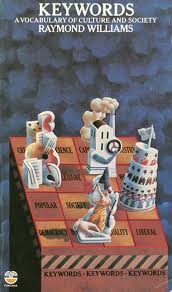 Raymond Williams: Keywords - A Vocabulary of Culture and Society (1976, 1983, and no doubt other editions).
Raymond Williams: Keywords - A Vocabulary of Culture and Society (1976, 1983, and no doubt other editions).
 Review 30 Sept 2015
Review 30 Sept 2015Interesting but not first class book on etymology & clusters of words with related meanings. And the media.
Raymond Henry Williams (1921-1988) slotted in exactly with the post-1945 expansion of universities. He never understood the modern world. Like many authors of the time, he occupied a sort of mental ecological niche.
He wrote Britain in the Sixties—Communications which was published in 1962, despite the title's suggestion of a retrospective view of an era. This and/or his 1958 book Culture and Society may have been his bandwagon climbing onto The Uses of Literacy (1957) which made Richard Hoggart's reputation. Williams' book has a lot of pre-computer 'content analysis'—counting pages and their content, and putting into categories. Williams knew nothing of rate cards of newspapers; or about subsidies, for example to the 'Worker'; or about BBC bias; or about Jewish media control; or about 'intelligence' people leaking into the urinals of the press. His information on The Press Council is taken from the news industry and proprietors. He included a lot about teaching, and I think invented or helped the idea of 'media studies' as a subject.
Williams' novel People of the Black Mountains (1989 - published after his death) seems to be a collection of linked stories on the Black Mountains region in the Welsh borders; a time travel theme back to 34,000 BC, starting with a car journey, responding to an emergency. I suspect this was work after retirement; he 'taught literature at Cambridge'. I have no idea how successful this novel was; certainly it was on sale in Welsh gift shops at the time, and of course Williams is or was a Welsh surname.
Here's a plaudit taken from Internet: [Raymond Williams] was one of the most significant thinkers of the second half of the twentieth century, and a major figure in a socialist tradition that he continued, questioned, and renewed.. This of course could mean genuine socialism, but could also mean Jewish money power. Here's Williams' review of Bertrand Russell's life The Intellectual in Politics which shows Williams' rather naive world view, blankly innocent of Jews, their frauds and genocides, media control, and the controls on academics.
Keywords avoids anything technical - e.g. 'organic' in the sense of dealing with carbon chemistry. Nothing therefore on say force, energy, gravitation, electricity, or even vitality, nerves, digestion, body. This ignorance extends pervasively; e.g. 'image' has nothing on the magic-lantern projection sense, or 'imago' in the insect study sense. Legal words seem very under-represented. Of course the Jewish frauds surrounding the Second World War, including the nuclear frauds, are unknown to him.
His 1983 edition added twenty or so new words, to some extent of course coinings of the Jewish media. We have ANARCHISM/ ANTHROPOLOGY/ DEVELOPMENT/ DIALECT/ ECOLOGY/ ETHNIC/ EXPERIENCE/ EXPERT/ EXPLOITATION/ FOLK/ GENERATION/ GENIUS/ JARGON/ LIBERATION/ ORDINARY/ RACIAL/ REGIONAL/ SEX/ TECHNOLOGY/ UNDERPRIVILEGED/ WESTERN.
Rather absurdly he includes Marxist or near Marxist expressions as though they have a long pedigree (without delving into German and Hebrew). Also words like 'realism' and 'representative' - he seems to be forced to accept journalese and academic-journalese at their face values. He has nothing on religion. He has rather less than might be imagined on politics; e.g. 'party' is absent; so is 'conservative'. Americanisms are pretty much ignored ('liberal' gets a bit of a mention).
Also rather absurdly he accepts the convention of Latin as providing word origins; he doesn't seem to realise that Latin was once new and must itself have been derived; he has nothing on Indo-European or e.g. Hebrew and other Semitic languages.
His Introduction (rather long-drawn: Cambridge, the Kiel Canal, the Second World War etc) makes it clear that the Oxford English Dictionary was his inspiration - he records happening to look up 'culture' and finding this a meaningful experience. He describes being presented with the OED in its original 'paper parts' - 'Deject to Depravation, Heel to Hod, R to Reactive and so on..' And when trying to discuss the meaning of 'culture' at Cambridge tending to be frozen out as an obviously uneducated man. His reading of T S Eliot (whom he disagreed with) led to his own 1958 book Culture and Society, to which this in a twenty-year-younger form would have been the appendix had the publishers allowed. (Keywords was published by a small publisher).
He records a few foreign influences, perhaps to suggest wide reading; who on earth though are Bréal, Volôsinov, Stern, Ullmann, Spitzer and others? I haven't checked carefully, but I don't think he had any awareness of the Jewish Frankfurt School.
Here's a list of his A to C words: all Anglo-American-Jewish. Unfortunately, Williams was just another mediocre academic, a useful idiot, a saviour who was fast asleep. Just right for the post-1945 Jewish world. Or almost right: someone in Private Eye said that Williams was offended by posters in the London underground for films—perhaps '.. adventures of a young man whose principal interests are rape, Beethoven, and ultra-violence' - which obviously are approved by Jews.
AESTHETIC/ ALIENATION/ ART/ BEHAVIOUR/ BOURGEOIS/ BUREAUCRACY/ CAPITALISM/ CAREER/ CHARITY/ CITY/ CIVILIZATION/ CLASS/ COLLECTIVE/ COMMERCIALISM/ COMMON/ COMMUNICATION/ COMMUNISM/ COMMUNITY/ CONSENSUS/ CONSUMER/ CONVENTIONAL/ COUNTRY/ CREATIVE/ CRITICISM/ CULTURE